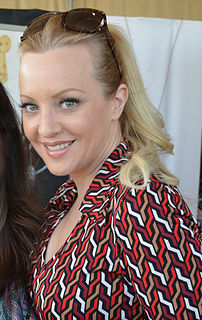A Quote by Wendi McLendon-Covey
I learned how to let other performers have their moment. A lot of people can't do that. They just chew the scenery and steamroll over their scene partners. It doesn't make you look better in the long run to do that. You have to have balance in your scene. If it's somebody else's moment, let them have it. Learn how to be generous. Plus, it makes the audience hate you.
Related Quotes
I moved to Chicago in the early 1990s and I studied improvisation there. I learned some rules that I try to apply still today: Listen. Say yes. Live in the moment. Make sure you play with people who have your back. Make big choices early and often. Don't start a scene where two people are talking about jumping out of a plane. Start the scene having already jumped. If you're scared, look into your partner's eyes — you will feel better.
Like any other person who reads a ton of books, I hate many, many books. Oh, how I hate them. I have performed dramatic readings of the books I hate. I have little hate summaries. I have hate impressions. I can act out, scene by hateful scene, some of these books. I can perform silent hate charades.
My whole effort is how to beautify this present moment, how to make people more celebrating, how to make people more joyous, how to give them a little glimpse of blissfulness, how to bring laughter to their life. Then the future takes care of itself. You need not think of the tomorrow, it comes. It comes out of this moment. Let this moment be of great celebration.
'Everwood' I think provides a unique feeling, an emotional experience. And other shows on TV don't have the acting talent to do that. Each one of our actors can do a serious scene and a humorous scene, and can do it all within the same sequence. They can go from a heartbreaking moment to a humorous moment.
I will do plays as long as they're interested in having me do them. It's the biggest opportunity to learn the most about how to act. Something I discover every time I'm doing one is how little I know about acting - how important the art of listening is, and how important it is to listen with your entire body. You can tell so much of a story with stillness, and a lot of that can be from really actively listening to your scene partner.
Improvisation in general is good, and improvising material into themes, turning the material into something codified and repeatable, taught me scenic structure and dramatic gambits that work and things that are appealing both as a performer and an audience member, like you know, what does "want" really mean in a scene, and how do you achieve your want, and how is that expressed, and how do you achieve closure? Those are all things that I learned performing at the cabaret after just doing the same scenes over and over and over again over the years, with my own ability to change.
How often are you worrying about the present moment? The present moment is usually all right. If you're worrying, you're either agonizing over the past which you should have forgotten long ago, or else you're apprehensive over the future which hasn't even come yet. We tend to skip over the present moment which is the only moment God gives any of us to live.




































